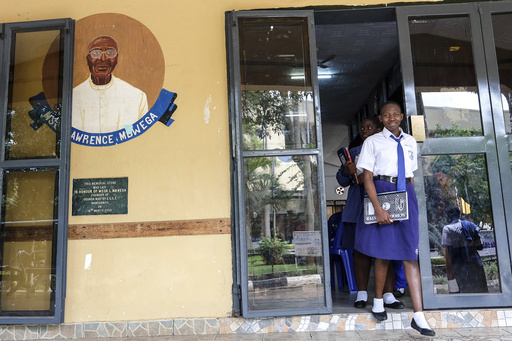In Kampala, Uganda, a tearful encounter unfolded in the staff room of a Catholic private school when a parent, burdened by unpaid tuition, implored the educators to enroll her son. The school’s policy necessitated a payment of at least 60% of the total fees for enrollment, a sum the mother could not afford, leading to her being escorted away. Beatrice Akite, a teacher at St. Kizito Secondary School in Uganda’s capital, witnessed the scene, which was an unprecedented and wrenching moment. She recounted this incident to underscore how unpredictable fees are forcing parents into distress and driving their children out of school across sub-Saharan Africa, a region already grappling with high dropout rates. Concerns are mounting over the Catholic Church’s role, as it is the largest nongovernmental education investor in the area but appears to fall short in lessening families’ financial strains.
The Catholic Church has built a legacy in Africa as a provider of affordable, quality education, particularly for impoverished families. Even as other private investors begin to view schools as profit-driven enterprises, this system remains desirable. Akite suggests that church authorities should consider measures to streamline fees and implement firm pricing across schools with similar standards. At Kampala’s St. Kizito Secondary School, founded by Comboni missionaries to aid poor communities, the tuition is $300 per term. While this is relatively lower than many other Catholic-run institutions in Kampala, students often report late due to an inability to pay the fees on time.
At Uganda Martyrs’ Secondary School Namugongo, a Catholic institution and one of the most expensive private schools in Kampala, the zero-balance policy requires full payment before students can begin their terms. The tuition, once as high as $800, has dropped to around $600 as enrollment grew. Yet, long queues of parents seeking extensions on tuition payments remain. Daniel Birungi, an electrical engineer, whose son newly enrolled at St. Mary’s College Kisubi, reflects on rising expenses in traditional Catholic schools and their slow trend towards exclusivity for affluent families. Tuition there is approximately $800 per term, and Birungi fears he may struggle to keep up with payments.
The issue of steep school fees surpasses even medical expenses in most of sub-Saharan Africa. According to a 2023 World Bank report, 54% of adults in the region highlight education costs as their most pressing financial concern. Catholic schools, while not-for-profit, face competitive pressures similar to other private entities and cannot solely rely on charitable operations due to their maintenance costs and scholarship offerings. Ronald Reagan Okello, a priest overseeing Catholic education in Uganda, acknowledges the challenges in controlling tuition costs within this competitive landscape. Families are advised to enroll their children in schools they can feasibly afford.
Across the region, the Catholic Church is seen as a pillar in areas underserved by the state, holding a reputation for disciplined, value-based, and academically successful education. In Zimbabwe, Catholic institutions range from those in low-income areas with affordable tuition to elite boarding schools charging hefty fees. However, fee hikes and privatization initiatives threaten the inclusive legacy of Catholic education. Many worry that privatizing church-founded schools might inflate tuition fees, sidelining working-class families, as Peter Muzawazi, a prominent local educator, warns. He stresses that Catholic schools must remain affordable for vulnerable groups.
In Zimbabwe, where economic hardship is pervasive partly due to international sanctions, controversy brews over efforts to privatize longstanding mission schools. Some argue that privatization is essential for maintaining educational standards, yet critics worry that this shift could turn Catholic leaders away from the poor. Suggestions have emerged to build new schools instead, potentially experimenting with different financial models, as voiced by Muzawazi. He advocates for harnessing the talent of individuals from all economic backgrounds to benefit both the church and the nation.
Through these unfolding challenges and debates, the quest remains—how to continue providing essential education to those in need without succumbing to the pressures and pitfalls of privatization. The Catholic Church’s role in education is at a crossroads, confronting economic realities while seeking to stay true to its mission of serving and uplifting the underprivileged.



